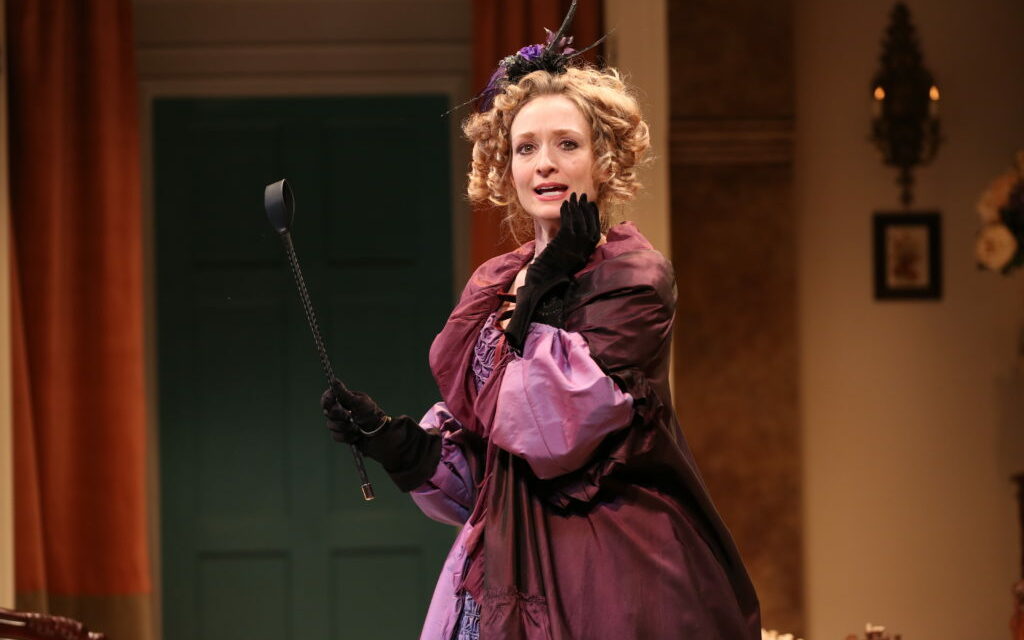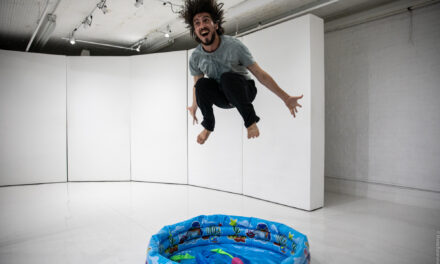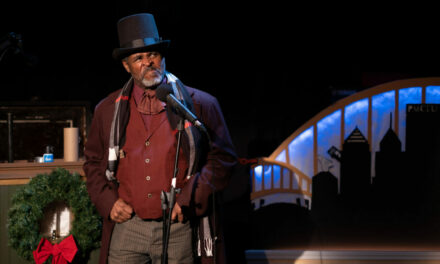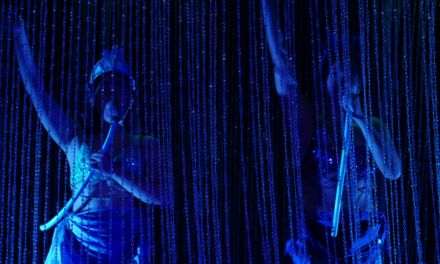Rachel Pickup is currently playing Lady Gay Spanker in London Assurance, written by Dion Boucicault and directed by Charlotte Moore. The show, which is playing at the Irish Repertory Theatre until February 9th, dates back to its premiere at Covent Garden in London in 1841. The play, set in London in the 19th century, features a slew of eccentric characters and mishaps in what is billed as a classic comedy of errors.
Pickup is an award-winning British/American actor who has performed in London’s West End, at Stratford Upon Avon with the Royal Shakespeare Company, in New York On Broadway and Off-Broadway, on film and television, and at many leading regional theatres throughout the UK and in the US. She is on the association for The National Youth Theatre Of Great Britain, a vice president of The Actors’ Centre UK, and a member of the Actors’ Center NYC.
Tickets to London Assurance range from $45-$70 and are available through Irish Rep’s box office at 212-727-2737
or online at www.irishrep.org.
We chatted with Pickup recently about her role in London Assurance and how it feels to play a strong woman in the 19th century in 2020.
Holly: Congrats on your role in London Assurance. The play is very much a commentary on class/gender and seems to stand on its legs in 2019. What was it that attracted you to play this role?
Rachel: The main thing that attracted me, to be honest, is that I was scared of it. When Charlotte, our director, offered the role to me, I told her that I didn’t know if I could do this. The two actresses who had done it before, Fiona Shaw and Elizabeth Briggs, and I feel so rampantly different to them. Charlotte is lovely and knows her stuff, and I trusted her. I found the play delightful. The other actresses all agree that it’s super feminist. The women are in control and know everything that is going on. These women are smart, and it’s terrific that this period piece has these forward-thinking women in it.
Holly: Do you enjoy working with women, and how important is it to your work??
Rachel: It comes increasingly so. It always has been. It’s not that men have nothing to offer; we are just trying to address the balance of it. It’s the same with so many other areas of discrimination and lack of equality. It is lovely to be working with powerful women. There are only three women out of a cast of ten, again that is because it’s a period play Nowadays, we can stretch casting in all sorts of different ways, which is fantastic. Still, I agree with Charlotte that in this play, it was not right to change the gender of the male characters as we are doing it in period style.
Holly: What has your collaboration like with director Charlotte Moore been like?
Rachel: This is my third time working with her. She has immense trust in her actors and in her whole team, which is a great feeling. She won’t let you get away with anything that’s not true to the work. A comedy like is this is so huge, much larger than life – you talk to the audience, for example. There are a lot of theatricalities built into this play, and humor of course. But her golden rule is to make it truthful. She makes you ask for a cup of tea rather than laugh. She trusts her cast, and you’re free to try things in the room, make mistakes, and not feel like a failure. Her rehearsal space is a very trusting one. I feel like I can ask a question when I need to. She has a great eye.
Holly: How familiar were you with the play and Dion Boucicault’s work?
Rachel: Admittedly, I was completely unfamiliar with Boucicault ‘s work and came to it completely fresh. It’s a classic, slightly neglected play, and so often, we come to plays with preconceived ideas. Or else we’ve seen multiple productions, like Shakespeare or Wilde or Coward, or we’ve even acted in them. While I’ve had Fiona Shaw and Elizabeth Spriggs in mind {they have played the same role in previous UK productions} throughout the run of the show, I had never seen them in the part. Therefore, I have been able to tackle it in a completely new way. Charlotte had seen a production of it in London, but the rest of us had not and have been treating it as contemporary work.
Holly: How do you approach your character as Lady Gay Spanker, a character who seems very empowered and ahead of her time in terms of female empowerment?
Rachel: For her, it’s all fun. She’s in love with life. She wants people to wake up in the morning and think it’s great to be alive. She has an appetite for food, hunting, the house, the countryside, for sex, for love, her husband. She wants everyone else to have that, too. I’m in love with the idea of this beautiful love affair happening. She certainly never planned on hurting anyone’s feelings. Charlotte told us in rehearsal that there isn’t anything mean about the play. It’s fluffy, frivolous, and popcorn and candy floss. There are messages about love and the differences between men and women, but it’s done in a spirit of generosity and a full heart.
Holly: How do you feel about the fast pace?
Rachel: We all feel the quick pace. The playwright wrote this play when he was 20 in three weeks. When you dig into it, you find things that could be clearer. But it’s a romp, so you do feel the need to romp through it. Charlotte always wants things to be precise. Hopefully, that translates to the stage.
Holly: Do you feel a difference between British and American audiences?
Rachel: I don’t want to generalize, but I do think that American audiences are less inhibited. I believe that the old English reserve is a cultural thing. Once a play starts trickling along, you need one person in the audience who gives everyone permission to laugh. Once that laugh starts trickling along, people feel free to laugh and join in. The play is just so joyfully silly. I have that first hour of just watching it before I come on. I come upstairs early, way before my entrance, to watch because it is glorious, silly, and an enjoyable play.
Holly: What’s next?
Rachel: I’m doing a play called Boundaries by Honor Molloy. She wrote another play at the Irish Rep called Crackskull Row. It’s about seven or eight women. It’s about a maternity hospital in Dublin and sweeps through time. It’s very ambitious and very exciting.
This post was written by the author in their personal capacity.The opinions expressed in this article are the author’s own and do not reflect the view of The Theatre Times, their staff or collaborators.
This post was written by Holly Rosen Fink.
The views expressed here belong to the author and do not necessarily reflect our views and opinions.


















